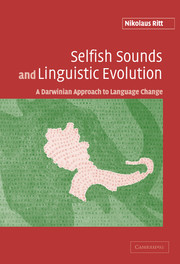Book contents
- Frontmatter
- Contents
- List of figures
- Preface
- 1 Introduction
- 2 The historical perspective
- 3 Approaching ‘language change’
- 4 The Darwinian approach
- 5 Generalising Darwinism
- 6 Towards an evolutionary theory of language
- 7 What does all this imply for the study of language change?
- 8 How to live with feet, if one happens to be a morph-meme
- 9 The prosodic evolution of English word forms or The Great Trochaic Conspiracy
- 10 Conclusion
- References
- Index
1 - Introduction
Published online by Cambridge University Press: 22 September 2009
- Frontmatter
- Contents
- List of figures
- Preface
- 1 Introduction
- 2 The historical perspective
- 3 Approaching ‘language change’
- 4 The Darwinian approach
- 5 Generalising Darwinism
- 6 Towards an evolutionary theory of language
- 7 What does all this imply for the study of language change?
- 8 How to live with feet, if one happens to be a morph-meme
- 9 The prosodic evolution of English word forms or The Great Trochaic Conspiracy
- 10 Conclusion
- References
- Index
Summary
The benefits of language
It might be premature to decide whether our species has been an evolutionary success or not, but the number of its members has clearly increased exponentially during the last 100,000 years or so. Most probably, one of the main reasons why humans have been so extraordinarily successful in reproducing before dying is that they have language.
Language helps humans to establish within their minds representations or models of the worlds in which they live, and enables them to carry out experiments on those models. Since these experiments take place in the virtual realities of their minds, humans do not have to suffer their actual, potentially harmful consequences. Indeed, the particular ease with which language allows them to direct and control their own thinking seems to distinguish them from most other animal species, which seem to be much more strongly constrained – be it by external stimuli or by instincts – in what they ‘think about’.
Language also allows them to share knowledge. Each individual can thus learn about the experience of others and avoid repeating their mistakes. The possibility of sharing information through language is not only good for individual humans, however. It is socially significant as well, since it makes all human beings, at least potentially, useful to one another. This might be an important factor behind the unique social instincts that characterise the human species.
- Type
- Chapter
- Information
- Selfish Sounds and Linguistic EvolutionA Darwinian Approach to Language Change, pp. 1 - 10Publisher: Cambridge University PressPrint publication year: 2004

